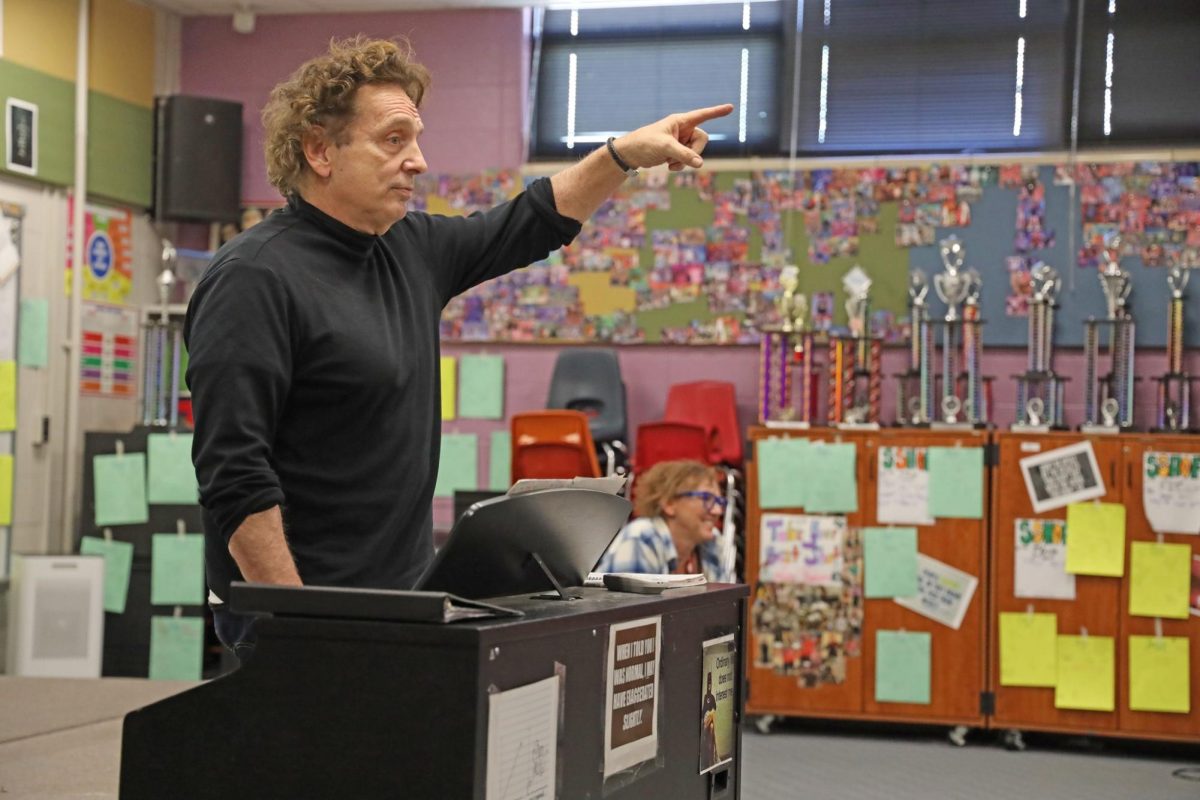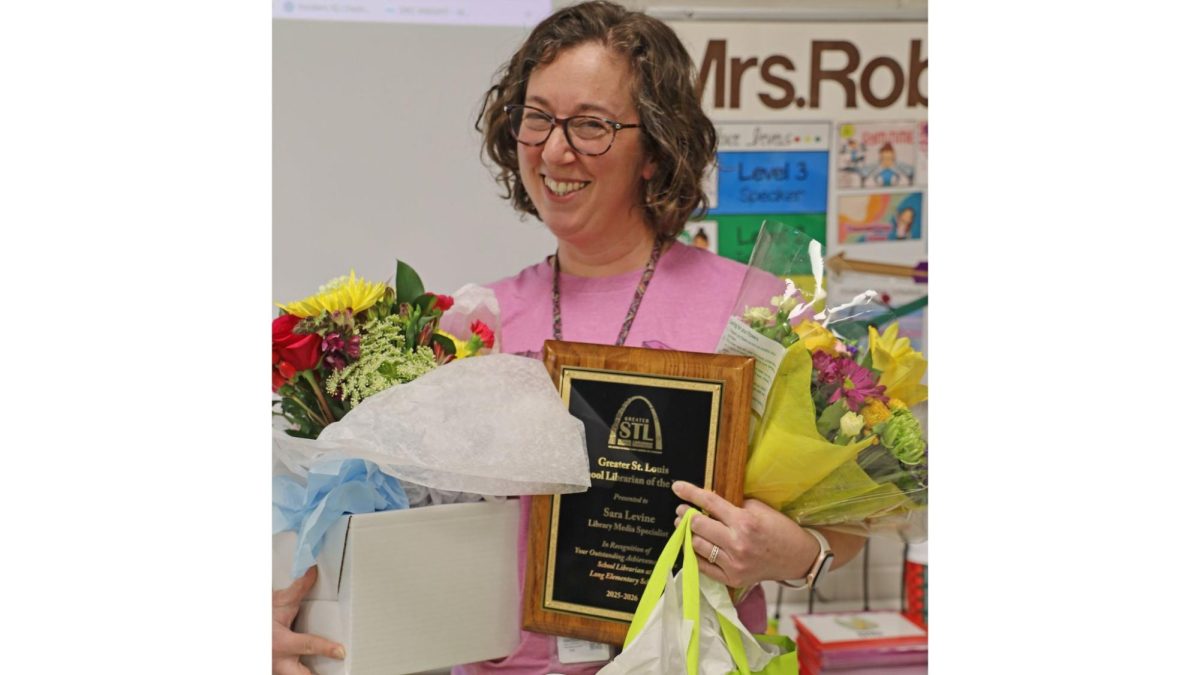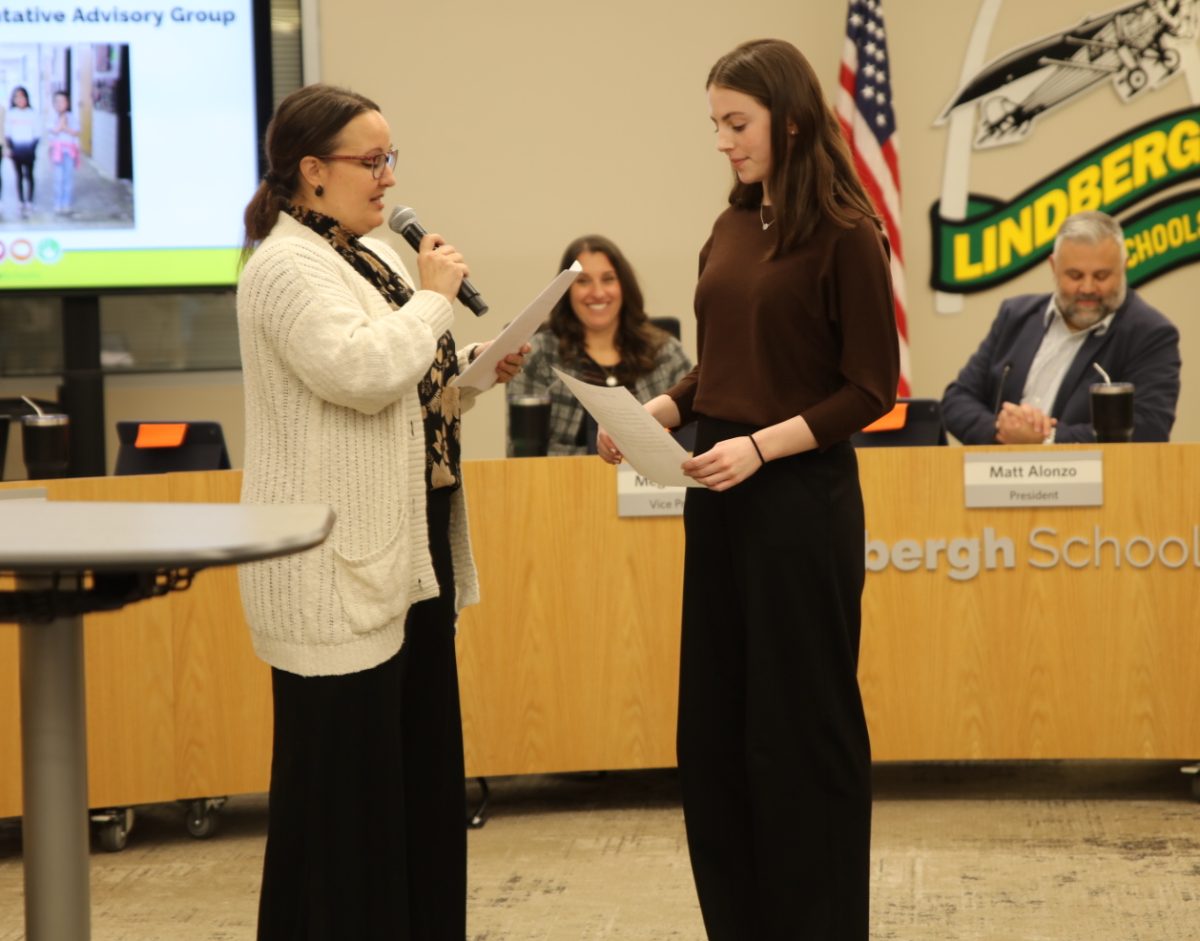This year’s race for the Lindbergh Board of Education features five candidates running for two open seats.
The candidates include incumbents Jennifer Miller, current board vice president who has served since 2016, and Julia Voss, who has served on the board since 2022, as well as Russell Dahmer, David Randelman and Martin VerPlank.
The municipal election will be held April 8.

Dahmer is a retired civil engineer and a 1974 Lindbergh High School graduate. He and his wife, Marjorie Dahmer, have two adult children.
When asked why he is seeking office, Dahmer said: “To refocus the school board on academic excellence.”
Miller is an early intervention therapist with Missouri First Steps. She is also on the EdPlus Board of Directors, a Special School District Governing Council alternate, a board liaison to two Lindbergh board advisory committees and one Lindbergh task force, a Sperreng Middle School PTO board member and Lindbergh High School PTO board member. She and her husband, Eric Miller, have two children in the district: a sophomore at Lindbergh High School and an eighth grader at Sperreng Middle School.
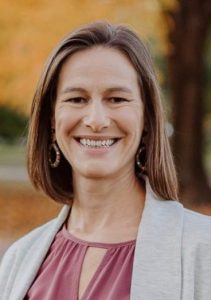
When asked why she is running, Miller said: “I want to ensure Lindbergh remains a top district focusing on rigorous instruction for all students, creating and implementing workforce development programs, sound fiscal practices and safe and secure school buildings. I will continue prioritizing student learning and listening to community feedback about what is most important for Lindbergh.”
Randelman is an IT specialist, Cloud computing architect at RGA. He and his wife, Maki Randelman, have four children: Role, 20, Roniel, 19, Dror, 13, and Moriah, 9. Randelman has “28 years of Lindbergh experience across (his) children’s education.”
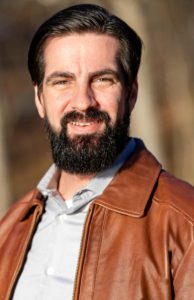
When asked why he is seeking office, Randelman said: “I am running to advocate for students, parents and the taxpayer. I have personally canvassed over 4,000 homes (an additional 10,000 with volunteers), learning what works and what needs improvement in our district. With over a decade of involvement in Lindbergh, I have gained a deep understanding of K-12 education, fiscal responsibility and leadership.”
VerPlank did not return The Call’s questionnaire.
Voss is the director of litigation support and eDiscovery at UBGreensfelder, LLP. Voss was an attorney at Greensfelder from 2003-2014 before assuming her current position as director. She and her husband, Kurt Voss, have three children enrolled in the district: Gillian, who attends Lindbergh High School, and Lucy and Jonah who attend Truman Middle School.
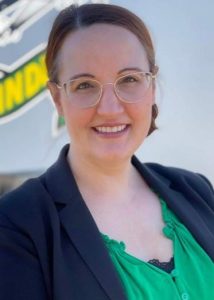
When asked why she is running, Voss said: “I am proud of the Lindbergh community and want to continue helping it grow. Over the past three years while I have served on the board, the district has continuously sought to improve its offerings and help students reach their potential. I would be honored to be allowed to continue to be a part of that work.”
The candidates gave the following responses to The Call’s questionnaire:
Editor’s note: The following questions and answers appeared in the March 27 print edition of The Call. They may have been edited and shortened for grammar, clarity and space. Keep reading for web-exclusive responses from the candidates.
What issue do you consider the single most important issue in this race and why?
Dahmer: “The single most important issue is academics. Academic performance in the Lindbergh District is in decline and our students, community, state, and country deserve better – our future depends on it.”
Miller: “Maintaining continuity in the board’s work in education, academics and fiscal responsibility from goals prioritized by the Lindbergh community.”
Randelman: “Aside from our academics, Lindbergh Schools, like many districts, have allowed sociopolitical issues to become a priority. I believe this hurts our community unity. Our district must maintain neutral, objective teaching that respects all students and their family values.”
Voss: “I do not think there is any one issue that is most important. The district is in a good place. Teachers and the administration work together to constantly improve processes and offerings to students. The most important thing is to elect people who will collaborate with the superintendent to keep that progress moving forward.”
Other issues you perceive in your race and your position on each?
Dahmer: “The issue very closely behind academics is financial responsibility. The Prop R indebtedness is a ticking time bomb and must be addressed before property tax increases swamp the community.”
Miller: “Test scores. We must understand that the Missouri Department of Elementary and Secondary Education is de-emphasizing MAP (Missouri Assessment Program) scores and will use other data to score districts. DESE is moving away from a one-time yearly test and towards the use of ongoing assessments to measure growth throughout the school year.”
Randelman did not answer.
Voss: “The numerous potential legislative/executive actions that impact public school budgets and create confusion around initiatives meant to ensure that each student has the support they need to succeed could be difficult to navigate.”
What are the biggest challenges, short term and long term, facing Lindbergh Schools?
Dahmer: “The biggest short-term challenge is getting Lindbergh back on the track of academic excellence; students only have so many years in school and every year is critical. The biggest long-term challenge is the financial condition of the district and the weight of Prop R indebtedness.”
Miller: “There is some uncertainty around the future of public education, school funding and special education services for students. Lindbergh must remain vigilant on these topics and ensure our students have access to an excellent education and programming.”
Randelman: “In recent years, focus on social and cultural issues have taken away focus from academics. As a result, we have declined compared to our neighboring districts who, on average, outperform us by 10 points. The short-term is the erosion of our reputation as a top school district. The long-term is that we risk losing being an affordable, destination district – and I wish to prevent that.”
Voss: “Changes to revenue sources will be challenging to navigate. Public schools are funded by taxes. If state income taxes, federal taxes and personal property taxes decrease as some proposed legislation seeks to do, schools will struggle to adjust to a reduction in revenue at a time when expenses are increasing. With additional potential changes to revenue that would occur with open enrollment and charter schools, long term planning is difficult.”
What are areas of concern regarding student achievement in the district? Do you have specific suggestions for improvement? How can the board remain focused on student achievement?
Dahmer: “The current percentages of students performing at or above proficiency are shockingly low, in most areas below 60% of students are proficient and, in some areas, proficiency is below 50%. The board must refocus away from social issues back to academics.”
Miller: “Student achievement must always be a top priority of Lindbergh Schools. Recent NWEA, iReady and FastBride test results show Lindbergh students continue to make gains and surpass national averages. True understanding and deep learning are the only ways to address student achievement.”
Randelman: “The current board shows little debate, direction or leadership on how to improve student achievement. There is an over trusting attitude towards the school administration and lack of accountability towards parents, students and the taxpayers. If I am elected, I will be accountable only towards the community and what they expect from their school district.”
Voss: “I would like to see the district put its focus on elementary math to ensure we are setting our students up for success as they proceed into more difficult math classes. We have math TAs to help the K-12 students, but we should evaluate additional math interventions. Elementary math curriculum will be under review this summer, so I would encourage that team to consider how we are addressing all of our priority standards.”
How would you work to keep politics out of the board’s decision-making process?
Dahmer: “Another odd question since the current board seems to be driven by non-academic agendas such as critical race theory, DEI and ‘decolonization.’ I would work to remove these political agendas and refocus on classical education in reading, writing, mathematics and the sciences.”
Miller: “Board members should always put students first. My track record as a current board member shows I do not bring politics into board decisions.”
Randelman: “Simple, go back to our common denominator: common-sense education, promote independent thinking, and return to our roots of reading, writing and arithmetic.”
Voss: “The board should be making decisions based on what is best for the students and the district. The board members may have different opinions on what is best, and those differences may arise because of differing political beliefs. I would steer board members towards focusing on what the outcome for students is, not on a political talking point.”
If future budget cuts are needed, what do you propose eliminating from the budget?
Dahmer: “Any and all spending including personnel related to DEI, the continuous turnover of library books and reducing the number and salaries of administrators would be a good start.”
Miller: “Further analyze the annual budget to determine what expenditures will have the least impact on student learning and achievement. Lindbergh has been diligent in using zero-based budgeting to find financial efficiencies. This method must continue to be used. The Finance Board Advisory can also provide input”
Randelman: “The truth is, with stagnant enrollment and birth rate decline, the school district will start losing student population in the next few years. If we come to a time that this happens, we will likely have to consider consolidating our buildings. Here is what I would not want to do: a four-day school week. This is something now added to our Lindbergh board policy, and I fear it is preparing for this transition in the future.”
Voss: “I would advocate for all departments to cut their budgets a small amount rather than eliminate programming, if possible. I would ask administration to determine whether this was a long term concern or a short term issue, and to consider whether any planned expenses could be delayed or eliminated completely.”
Keep reading for web-exclusive questions and answers from the candidates
Editor’s note: The following questions are as they were submitted to The Call by the candidates in their entirety. They have not been edited in any way, other than to ensure appropriate language and no direct attacks on opponents or other candidates.
Are you satisfied with the leadership of Superintendent Tony Lake?
Dahmer: “The School Board has the primary responsibility for the current situation at Lindbergh Schools, however, Dr. Lake has considerable authority and responsibility for district direction and operations, thus, I must say, I am not satisfied with his performance.”
Miller: “Yes. Dr. Lake continues to seek input from staff, students and community members to ensure the district’s work is a reflection of the Lindbergh community’s priorities. He has implemented strategic planning, found budgetary efficiencies and prioritized academic growth for all students.”
Randelman: “The position I am a candidate for is a seat on the School Board, because ultimately, the board sets the tone and leadership. With that being said, I have had several interactions with our current superintendent, and I don’t think he takes our concerns seriously. A recent example is the complete rejection of the gifted program affirmative action, which turned out to be true.”
Voss: “Yes. Dr. Lake is a transparent leader who builds bridges within the community. He creates opportunities for the community to reach out to him at ‘Listen & Learn’ events, community breakfasts and Parent Leadership meetings. He meets regularly with teachers and makes all decisions based upon what is best for students.”
Do you support Lindbergh s Strategic Plan? How is the district doing in following the plan? Should the district follow a strategic plan in the future?
Dahmer: “Lindbergh’s Strategic Plan is not addressing the decline in academics and has led to a potential financial crisis.”
Miller: “Yes, I support Lindbergh’s Strategic Plan and believe it is important to continue using one going forward as it outlines the work of the district. Lindbergh completed its second strategic plan last year with the input of community members, staff, and students. Quarterly updates are given during Board Workshops so the public can stay up-to-date on the work Lindbergh is doing.”
Randelman: “I have seen that our school district is focused on educational trends, and not so much on evidence-based curriculum. Our current strategic plan has put in place many satellite programs to our core, some are good, but many have caused controversy like weaved in social justice and critical pedagogy. The choice we make when advocating for certain lifestyles or values is finding conflict with the way of life or values of many families, and this is a big part of why we are behind in our enrollment growth. I want us to find unity again, as Americans, under our constitution and liberty.”
Voss: “Yes. It is important to have goals articulated so that every decision is made only if it furthers the strategic plan. No district can follow through on every potentially good idea. We must reflect upon what is most important to us and concentrate our efforts on ensuring those goals are met. The district is following the plan. For example, every large expenditure is made only after considering which goal it furthers, and in Board Advisory meetings, we often consider how the work we are discussing relates to particular goals.”
How did you vote in the April 2024 election on the district’s $150-million no-tax-rate-increase bond issue, Proposition R?
Dahmer: “Since Prop R is a reality, the proper questions are: ‘Is the board wisely and prudently spending the Prop R money?’ ‘ Is Prop R truly a “no-tax-rate-increase bond issue?’ The answer to the first question is no. The board is only making interest payments on the Prop R bonds. This extends the time before the bonds are paid off and significantly increases the amount the district taxpayers will have to pay. The current board must openly and publicly provide all the calculations of projected revenue, debt service costs, and – importantly – the assumptions underlying each to provide complete transparency to the community to prove Prop R is truly a ‘no-tax-rate-increase bond issue.’ At present, there is no reason to believe it is.”
Miller: “I voted in favor of Prop R 2024. I am pleased the district’s plans provided much-needed renovations to school buildings, addressed safety and security issues at all buildings and allowed for gyms to be built at three of Lindbergh’s elementary schools.”
Randelman: “I was in favor of school improvements, but I was not in favor of financing $150 million with $110 million additional in interest. The ‘no-tax-rate-increase’ is a wrong title to describe what is a tax that will end up costing the average household in this district over $13,000. The premise of this tax hinges on our property assessments going up 6% every year until the principal can be paid back. Tax assessment increases are tax rate increases. If we fail to reach our obligation through assessments, taxes will go up.”
Voss: “I voted in favor of Prop R.”
If additional revenue is needed for the school district, how do you propose obtaining that revenue?
Dahmer: “Interesting question since the current board promised the community that Prop R is a ‘no-tax-rate-increase bond issue.’”
Miller: “All means of finding additional funding should be exhausted before asking the community for an operating tax rate levy. Lindbergh continues to have the lowest residential tax rate in St. Louis County and works hard to provide our community with an excellent education. Using grants and partnerships with local businesses allows Lindbergh to provide extra programming for students at low to no cost to its residents.”
Randelman: “There are still options of optimizing spend and focusing it on the students and teachers who need it. Eliminate pilot programs that are expensive. Remove DEI programs that are chewing at our operational expenditure and taking focus off academics and reduce our top-heavy administration.”
Voss: “I would first look to see if there was money currently allocated to a non-essential item in the budget that could be reallocated. Then I would encourage the department that needs the money to consider whether there are available grants that could help. For example, the new nursing program at the high school will be 75% funded by a grant from DESE. I would ask the administration to consider whether programs that bring in revenue offer any additional opportunities”.
Do you support the district’s decision to offer 1:1 technology/laptops?
Dahmer: “While computers are a critical and essential part of 21st century life, children – particularly at the elementary school ages – must learn to perform basic math, read, spell, utilize proper grammar and understand basic scientific principles on their own.”
Miller: “Yes. Technology is used in many aspects of our daily lives and is required in many job markets. Students need to be proficient in appropriate technology usage to prepare for the future. I also believe pen-to-paper tasks are important and should be used in the classroom as they promote retention of learned material, increased brain activity and fine motor development.”
Randelman: “Laptops and technology are important but also proven to be sub-optimal when compared to handwriting and keeping focus in the class. There is a place for laptops in certain classes, but I would like to see the removal of smart devices during most core classes and adding specialized computer instruction that will teach students how to prompt technology like A.I. and programming skills.”
Voss: “Yes. Technology is not optional in today’s world, so it is important that every student has what they need to succeed.”
What issues do you believe the district needs to address in its academic programs and offerings? What changes would you recommend?
Dahmer: “There must be a fundamental emphasis in the lower grades on reading by classical means such as phonics, spelling, grammar, capitalization, sentence structure and punctuation. A classical approach to science and mathematics – much as Lindbergh taught decades ago – must be revived. Homework must be reinstituted, challenge classes in middle school restarted and math assistance provided once again”.
Miller: “Lindbergh has recently implemented a structured literacy curriculum and Tier 3 math intervention for students. These were changes that were desperately needed and I’m glad students have access to these programs. Lindbergh offers a variety of programs for students and is responsive when something different is needed.”
Randelman: “The truth is, how to teach our students evidence-based curriculum is well known. While we are slowly inching back towards evidence-based, it is still a snail pace that is leaving over 40% of our students behind and not meeting their grade proficiency requirement. We need to accelerate this process.”
Voss: “The programs at the high school are well rounded, rigorous and offer something for every student. New opportunities are added every year. For elementary, I would like to try and find a way to incorporate foreign language as young as possible, although I acknowledge that it is difficult to find a way to add new programming into an already full day. At the middle school level, I would like to see the district continue to work on differentiation in the classroom for students who are ready for more challenging tasks.”
What is your opinion on charter schools?
Dahmer: “A better question is, ‘Why are charter schools or school choice of any description an issue?’ The answer is that parents in significant numbers are disillusioned with the public schools, which are teaching things the schools should not and are not teaching what they should. The way to protect the public schools from the school choice movement is to have academically excellent schools free of controversial programs.”
Miller: “I believe any school that receives public funds should be held to the same accountability standards as a public school. While charter schools can be a good choice for some families, I feel the traditional public school model provides more accountability while meeting the needs of all students.”
Randelman: “I would like to see our public school go back to being a blue ribbon, magnet/destination district so that the question of charter school does not even come up.”
Voss: “I do not support them. Most come and go over a short period of time because they simply cannot compete with the public school system. A non-partisan study out of Stanford showed that 83% of charter schools performed either the same or worse than public schools. Charter schools do not have the infrastructure set up to help kids in special education or who have non-typical learning styles. They do not have the resources to have robust extracurriculars. They are not overseen by an elected board. They siphon funds from public schools. They do not invoke the same kind of pride from the community as a public school. We should be investing in public institutions that form the basis of a community, like Lindbergh. Not in transitory schools that will not be around in a few years.”
What do you propose to ensure that the district continues to retain teachers?
Dahmer: “The way to retain any professional is to have a winning team. A district with falling test scores, low proficiency rates and controversial programs is not a winning team. The way to retain the best teachers is to have an academically outstanding district free of unnecessary controversies.”
Miller: “Lindbergh currently has a very high teacher retention rate. The current board and administration have worked diligently to build positive relationships with our teachers and we must continue to do so to retain and attract high-quality teachers. We value their input, include teachers in decision-making processes and work together to do what’s best for students.”
Randelman: “Lindbergh Schools has a reasonable retention rate, although I wish to see more incentive for top-performing teachers. I believe maintaining a good relationship with our teachers by continuing with a supportive work environment and good educational tools will help maintain that.”
Voss: “The district should continue to ensure that its teachers are appropriately paid, have professional development that is relevant to their needs and treat them with respect.”
Are you satisfied with the district’s security efforts?
Dahmer: “The improvements at the new high school are very good. However, as recent events have shown, there is no substitute for SROs on site. This includes all our schools.”
Miller: “Yes. Lindbergh has procedures and protocols in place to address a variety of safety concerns. The district has prioritized safe and secure entrances at all schools and is installing safety film on glass doors and entrance windows. They continue to stay informed of current best practices in the areas of safety and security. Truman Middle School’s renovation includes many safety upgrades and Kennerly, Crestwood and Long will soon have gyms that double as storm shelters.”
Randelman: “I think we focus too much on passive defense measures. I come from a country where the question of security in schools had to be addressed. The answer is to have active protection instead of passive protection. We need guarded ingress and egress points at an exterior perimeter with armed and trained security. This is how we solved it in Israel, schools were never hit again.”
Voss: “I am, but that does not mean we declare success and stop improving. Since I joined the board, the district has updated facilities to have secure entry points, (added)) reinforced glass where appropriate and has evaluated the procedures we have in place for emergent situations. The Centegix badge system we purchased allows employees to immediately declare an emergency and alert an entire building of a concern. We also added an additional police officer so that each middle school has an officer instead of sharing one. I will continue to ensure that the district keeps asking whether there is more that can be done to keep students safe.”
Should the board rely on the advice and recommendations of the financial professionals of the district’s Finance Committee to make major financial decisions, including whether to approve salary increases and budgets?
Dahmer: “The Finance Committee can and should provide thorough and transparent information to the board and advice and recommendations are welcome – however – the final decisions are the board’s to make.”
Miller: “The Finance Board Advisory was created to provide transparency to our community and is comprised of community members (many with professional financial backgrounds) students, staff and three board members. They review Lindbergh’s monthly financials and discuss upcoming expenditures and incoming revenues. As a board member, I appreciate knowing there are more people regularly reviewing financials and finance-related decisions and will always listen to their feedback.”
Randelman: “I think it is natural to listen and weigh the committee recommendations while maintaining fiduciary responsibility in making sure the student interests and that of the taxpayer are being utilized to the maximum efficiency possible.”
Voss: “The Finance Committee is made up of district employees and community members who have strong finance backgrounds. Their comments and review of the district’s finances are an incredibly helpful resource for the board, and we should take any concern raised by the committee very seriously.”
Should the district deficit spend for recurring expenses like salary increases?
Dahmer: “No.”
Miller: “No. Reserve funds should only be used for one-time expenditures and not for recurring expenses.”
Randelman: “No.”
Voss: “Ideally, no. But I would hesitate to say never. District revenue varies year to year, and if there is a year that is a little off the assumptions made for the year, it might be necessary. Moreover, the local tax revenue does not get disbursed to the district until December/January, so it can look like the district is deficit spending until that money comes in. But I would not plan to deficit-spend for recurring expenses unless the reserves had gotten too high.”
What is a school board member’s role and responsibility? How does that role differ from the role of superintendent or administration?
Dahmer: “The school board sets the direction and policies of the district and must monitor the district’s operations to ensure the administration is carrying out the directives given. The superintendent and administration handle day-to-day operations and ensure the board’s directives are faithfully carried out.”
Miller: “Board members are responsible for the governance of the district, approving the budget, curriculum and policies and hiring and evaluating the superintendent. They focus on the big picture, while administration focuses on the day-to-day operations of the district. I also believe board members should set the priorities and tone of the district and be accountable to district constituents as their elected representatives.”
Randelman: “School board members are primarily responsible for the governance, policy-making and representation of community interests.”
Voss: “The board sets policy and approves high-level actions to ensure that the district is educating our children and operating according to a set of ground rules. It also makes sure the superintendent is performing his or her duties appropriately. It is the role of the superintendent to run the day-to-day work in the district in accordance with those policies, using his/her discretion as an education expert to ensure the students’ educational needs are met.”
How should Lindbergh adapt to possible growing school enrollment?
Dahmer: “A better question is, ‘Do we really have a growing enrollment, and are the district’s projections realistic?’”
Miller: “Lindbergh must keep class sizes manageable to ensure academic learning and growth are not impacted. Right now, Lindbergh school buildings have space in them to match our projected growth for the next ten years.”
Randelman: “There is ample capacity, but if one were to look at the 2022 latest demographic study, one would see that is not a concern.”
Voss: “Lindbergh is lucky to be a district with growing enrollment. The renovations from the 2019 Prop and the recent Prop will set Lindbergh up for success, even with additional growth.”
What do you think of efforts to ban or restrict certain books from school libraries?
Dahmer: “There are well over 10 million titles in print in the English language. The Lindbergh libraries contain perhaps 10,000 titles. Thus, Lindbergh schools are already ‘banning’ over 9 million titles. The reality is that every book in the school libraries represents a choice made by the district. I support good choices in books that are academically useful.”
Miller: “I believe parents have the right to restrict what their own children have access to, but not hinder other children’s access.”
Randelman: “On my website, https://randelman.com/video-series/, I address this question in detail. The bottom line is that all books should be educational, bring growth and development and ignite the imagination. We have gone through a painful decolonization process motivated by political activism, and this needs to stop. Let’s go back to common sense.”
Voss: “I do not support the recent efforts to ban multiple books. While I do support a parent’s decision not to let their own child read a book, and there is a process in place to ensure a child cannot check out a book a parent has said they can’t, I do not believe that parents have the right to restrict access for all students. I also support a parent’s right to challenge a book in accordance with board policies, but the recent book banning efforts were not just a check on a book. They were an organized effort to remove a large number of books because of a political agenda that is a trend across the nation, and I see that as censorship. Nonetheless, each book must be evaluated on its own merit according to board policies, and a fair decision rendered after careful consideration of each book. As a lawyer, I sometimes must advocate for positions I do not agree with personally, and if a book that has been challenged truly violated a school policy, I would follow the policy, despite my personal feelings against censorship. However, many of the challenged books are memoirs of authors from traditionally marginalized communities. The books are their story – their personal journey through challenging situations. The fiction books that have been challenged offer an opportunity to enter into another world and consider how it is different than your own. Even if the books are hard to read in places or are more mature than every student is ready for, I would be hesitant to deprive our students of the opportunity to either see themselves in the stories or learn from them.”
How does your personal or professional history inform your approach to the board?
Dahmer: “As a retired civil engineer, I am well aware of the critical need for academic excellence.”
Miller: “As a former special education teacher and a current Early Intervention Therapist, I am familiar with the special education process and how important it is to meet the needs of all students. As a parent of two children in the district, I experience firsthand the impact of district decisions and how they affect families and their children. I serve on the Sperreng and Lindbergh High School parent group boards, which allows me to have regular contact with other parents as well as staff members and receive valuable insights into their day-to-day school experiences. My current role on the school board allows me to have in-depth institutional knowledge of the district and a deep understanding of the work Lindbergh is doing based on feedback from our community.”
Randelman: “I come from Israel, and my children have encountered antisemitism that was not curbed by our current board. It was a hard thing for my daughter, who lived here almost her whole life in America, to be called a ‘zio’ (a derogatory form of Zionist – the right of the Jewish people to self-determination). I have seen first-hand how some classes teach about Israel, WWII or the Jewish people – it is not doing enough to address a rising concern of misunderstanding towards history. We must teach history so we can learn from the past. My approach to the board would help restore that view.”
Voss: “As a lawyer, I am trained to carefully evaluate all sides of any issue before determining a course of action. My training will help me make fair and thoughtful decisions.”
How should board members make decisions on issues? Do you believe that they should always follow the recommendations of the administration? Do you believe that they should go against the recommendations of the administration? Or is there some middle ground?
Dahmer: “The school board has the ultimate responsibility for the performance of the district. While input, suggestions and recommendations are always welcome, the board must always have the final say.”
Miller: “There is always a middle ground. When a recommendation comes to the board for a vote, the board has already been provided with detailed information on the topic. Often, the topic has been discussed in prior workshops, board meetings or board advisories. By the time the recommendation is made, input from a variety of stakeholders has been considered and added to or changed the initial recommendation to its current form. Board members and others are encouraged to provide feedback during the development process and a board member should work with administration to ensure the final recommendation reflects what he or she and community members want.”
Randelman: “As mentioned earlier, the board and the administration need to work together. The board members need to make sure the district is following the board mission and direction and are fiscally responsible. The administration are the experts who will have the professional capability of providing feedback and planning instruction and curriculum accordingly.”
Voss: “The members of the administration are education experts. The board is not. So the administration’s opinions should be given weight on education issues. The board should ask questions to ensure those opinions have been well considered. In addition, the board must also consider the interests of all parties – most importantly, the students, but also teachers, parents and the community at large. So, I would never say that the board should always follow the administration’s recommendations in all instances.”
What is the best way to address differences in opinion on the board, or between the board and the administration?
Dahmer: “Differences are best settled by open and honest discussion and with transparent facts on the table. Different perspectives are essential to the effective operation of any organization.”
Miller: “Open communication with each other is the best way to address differences. Board members and administration must approach differences with an open mind and try to find commonalities. Lindbergh has developed Communication Covenants to guide board members and administration during discussion and their work together. These guidelines allow for differences to be addressed respectfully.”
Randelman: “The problem right now is that there are no differences of opinion. This is why I believe I can help bring some fresh energy and a more community-driven voice on the board.”
Voss: “I believe in listening before talking when there is a difference in opinion. I want to understand why the other person disagrees with me before I try to determine what the next step should be. It may be that they have information I do not have (or vice versa) and once that information is available to all, there will no longer be a disagreement. Assuming there still is a disagreement, I would reach out to other board members and administration to resolve any outstanding questions and understand all positions. If it is an issue that is going to a board vote, I would make sure that everyone knew ahead of time that I intended to speak on the issue so that they would be prepared to voice their opinion as well. Once a vote is taken, I would accept the decision of the board, even if it were not in line with how I voted.”
How many board meetings have you attended in the past year? In what other ways have you been involved with the district?
Dahmer: “Since the board ended most public comments, there has been little point in attending meetings.”
Miller: “I have attended every monthly meeting and quarterly workshop in the past year. I have also attended additional board meetings when they have been called. I am currently a member of two board advisories and one district task force. I currently serve on the EdPlus Board of Directors and as the Special School District Governing Council Liaison for Lindbergh. I am a member of the Sperreng and Lindbergh High School parent groups and volunteer at a variety of events at both my children’s schools and their extracurricular activities.”
Randelman: “I have either been present or watched every board meeting, and I am running for the school board to advocate for students, parents and taxpayers. With over a decade of involvement in Lindbergh, including twenty-eight years of student experience across my children’s education, I have gained a deep understanding of K-12 education, fiscal responsibility and leadership.”
Voss: “I have attended every board meeting and workshop in the past year except for one that fell on my son’s birthday. However, board membership is not only about meetings once a month. To fully understand the district’s work, a board member must volunteer considerable time diving into that work. Over the past three years, I have served on the following board advisory committees, attending every meeting that I was able to: finance committee, teaching & learning, technology, HR, student life. I have also served on the following task forces/committees: embedded credits, Farmers’ Club, standards based grading. In addition, I attend legislative update meetings, engage in professional learning for board members and speak with the Cabinet whenever I need additional context for any issue that is raised. And of course, my children keep me up to date with the more informal issues happening around the district.”
What would you propose to improve the district’s test scores?
Dahmer: “The curriculum must be refocused on academic excellence and away for social and emotional issues and other ‘fuzzy’ areas that waste time, cost money and depress test scores.”
Miller: “Student achievement is a top priority of the district and must be assessed on an ongoing basis to ensure all students are making gains. Nationally normed tests show students in Lindbergh are out-performing the national average across multiple grade levels and testing levels. I want to ensure each student is making measurable growth in all areas of their learning and is not being ‘taught to the test.’ Lindbergh focuses on the real skills and strategies students need to be successful in life and no longer teaches to the test.”
Randelman: “Stop the practice of grading for equity – restore reasonable levels of homework to improve school day learned material repetition. Grades should be merit-based, not a passing grade if a student simply participates in class. Spelling and grammar matter. Restoring math intervention will help struggling students. Restore challenge classes and let students with potential find their academic abilities.”
Voss: “Test scores are one data point used to evaluate student success. MAP scores are, of course, reviewed and evaluated, but the district believes, and I agree, that they are not the best measure of student success. The district is instead using a test to evaluate student success that measures both growth and achievement and has results that are available to teachers shortly after the test is taken. The teacher uses these results to immediately inform their teaching and help identify areas for growth for each individual student. This method of evaluation is more useful to students than the MAP scores that are not released until the next year. DESE has taken notice of the work Lindbergh is doing in this area along with a group of schools in the area called the Success Ready Network. DESE is collaborating with this network to design a new testing system that will be more valuable than the current MAP testing. This immediate feedback loop should help test and growth scores increase as our students are given more personalized learning. It is part of Lindbergh’s Compass Goals to have 80% of our students scoring at or above average on these exams. Keep in mind that if we were an average school, only 50% of our students would fit into those categories. The district holds high standards for its students. The scores for 2024 are available on the district website at https://sites.google.com/lindberghschools.ws/srsndashboard?usp=sharing. Across all grades that take the exams, last year the district met this goal in ELA and is close in math. A renewed focus on elementary math should help close this gap.”
How can the district better communicate with its residents?
Dahmer: “The district must be open, honest and transparent with the community. The current approach of always telling only the ‘good stuff’ must end.”
Miller: “Lindbergh recently completed a communication audit to address this very topic. The communications plan was recently presented at a board workshop and I’m excited to see how its implementation improves communication throughout the Lindbergh community.”
Randelman: “In one word – transparency. As a candidate, I have brought to light academic concerns, racial discrimination that our State A.G. got involved with and put a stop to, exposed what is really happening with our library books and brought transparency regarding our tax liabilities. In a sense, I have done more than some board members just as a candidate. Imagine the transparency and service I could do for the community if I were serving on the board?”
Voss: “The district does an excellent job of communicating. Parents often say there is too much communication, not too little. To help with that, the district is consolidating platforms to streamline communication. The biggest struggle is communicating what the schools are doing to those who do not have children or family in the system. While I have been on the board, the communications department has done a lot of work to address this difficulty. The website is being updated, information is available on a Facebook page and our communications department keeps the media informed of happenings in the district so Lindbergh is often featured on the news. Dr. Lake also holds meetings with PTG groups and meets with various other resident groups to highlight the district’s work.”
Have you been endorsed by any groups, organizations, unions, et cetera? If so, please list them.
Dahmer: “My campaign is strictly grassroots based on word of mouth; I have sought no endorsements and am not beholden to any group.”
Miller: “I have been endorsed by the Lindbergh NEA and the South County Labor Union.”
Randelman: “On my website, randelman.com, you can look at all my endorsements, among them former board members who hoped to see Lindbergh Schools continue their path on academic excellence. I believe it is still possible to be a regional destination school district and weather the falling demographics and prevent further academic decline.”
Voss: “I have been endorsed by the Lindbergh NEA (the local teachers union) and the Saint Louis Labor Council (AFL-CIO COPE). I have also received a rating of “Pro-Equity” by the Missouri Equity Education Partnership (MOEEP).”



